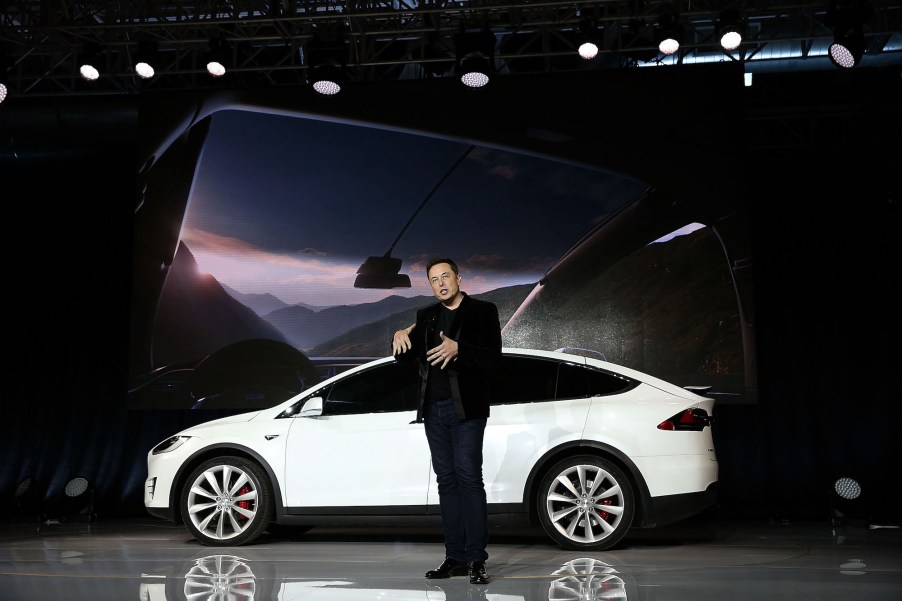
The Ford F-150 Outsold Tesla’s Entire Lineup in 2020
The Ford F-Series has been in production since 1948 and includes several full-size pickup trucks, from the F-150 to the F-750 Super Duty. Of all the F-Series models, the Ford F-150 has remained the most popular pickup truck in the United States since 1977. It’s also been the top-selling vehicle overall since 1981.
According to Ford’s 2020 fourth-quarter sales report, the F-150 held its top spot despite record-low sales due to the pandemic. That’s not to mention all the other vehicles Ford sells, from compact cars to semi-trucks. With that said, how did Tesla wind up with shares valued at nearly 76 times more than Ford’s?
Tesla might be a speculative bubble, Elon Musk said
In 2020, while many enterprises faced financial armageddon, Tesla’s shares skyrocketed more than 700 percent. Some investors practically became multimillionaires overnight, earning the cute moniker “Teslanaires.” However, long-term investors have described it as a roller-coaster ride as Tesla’s stock prices swung wildly from one extreme to another — sort of like the Bitcoin of the automotive industry.
Though plenty of external factors contributed to Tesla’s stock price fluctuations, CEO Elon Musk has also contributed. For one, he expressed doubt in Tesla’s bloated price a while ago. In April 2020, Musk tweeted, “Tesla stock price is too high imo.” As a result of that seven-word tweet, Tesla’s stock dropped by 12 percent and closed that Friday with a roughly 10 percent drop.
Examples like these remind us how sensitive the stock market can be. It should also remind us to be wary of speculative bubbles. We’ve experienced enough of them in the past two and a half decades. And to musk’s credit, he very well might’ve been telling the truth. Rather than viewing his tweet as raining on everyone’s parade, maybe he merely wanted them to bring an umbrella just in case. How many founders or executives do that for investors? How many pensions and 401(k)s could’ve been saved over the years?
Reevaluating Tesla as a tech company
Looking at a company’s share price is never a strategic way of estimating its value, whether good or bad. A company with a sizable share price can be in the mud financially; a company with a small share price can be doing great financially. It goes without saying that no one wants to own shares worth tens or hundreds of dollars each while the company is on the verge of bankruptcy. But owning stock worth pennies while the company is running well is every investor’s sweet spot.
The thing about Tesla is that it’s running well with a magnificent share price. But Ford is doing well, too, with a low share price — that sweet spot.
In early January 2021, the automaker released its “Tesla Q4 2020 Vehicle Production & Deliveries.” According to the report, Tesla produced 509,737 units, of which 499,550 were sold, missing its goal of 500,000 by only 50. However, the Silicon Valley-based EV manufacturer has sold only a little over 1 million units since it began producing the Roadster in 2008. That means Ford sold nearly as many F-150s in 2020 as Tesla vehicles sold in 13 years.
But is that a bad sign?
A company’s share price isn’t indicative of its health
How is it that Ford’s stock is worth $10 per share while Tesla’s stock is nearly $850? The answer might lie in the fact that Tesla is highly innovative. But one shouldn’t forget that in the mid-to-late-1990s, Ford’s share price was doing great. In May 1999, the all-time-high Ford stock closing price was 42.45. Then the dot-com crash took care of that, and Ford has yet to recover. Despite the pandemic nearly bankrupting everyone else, the good news is the Ford F-150 was the number one seller in 2020, Car and Driver reported.
Experts have suggested that maybe Tesla should be reevaluated as a technology stock rather than an automotive one. Some financial experts have begun noticing how Tesla’s valuations have significantly outperformed every other automaker — even those selling millions of units globally. Tesla has clearly soared far beyond comparing it to traditional auto companies. By reevaluating it as more tech than automotive, its status is arguably deserved.
Maybe we’re seeing the automotive industry’s future, as electric engines, efficient batteries, artificial intelligence, autonomy, terabytes of data storage, and IoT take center stage. If most of what a company puts in its vehicles is tech-related (assuming they’re all-electric), the line between the traditional automaker and tech company becomes blurred.


